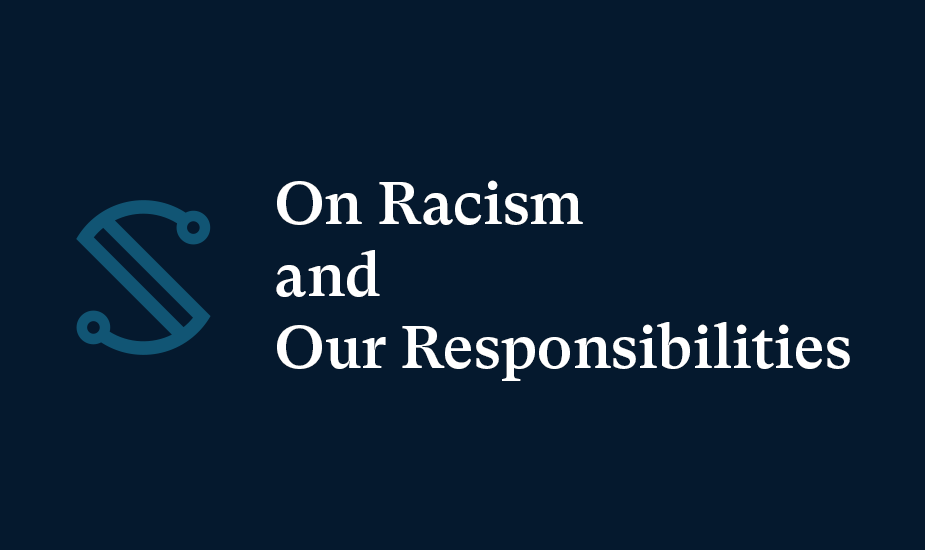
June 4, 2020
Adam F. Falk, President
The sickening murders of George Floyd and Ahmaud Arbery, recorded and then viewed by millions, represent but the smallest and most visible part of a centuries-long history of racist violence directed against Black Americans. Once again, Americans are speaking up in public spaces to express our shame at the racism our society permits and indeed encourages, and our desperate hope that we can be better. Equally important, we are also striving to listen, carefully and with humility, to the voices of those who have been harmed and continue to be harmed by the anti-Black racism that infects every corner of our society.
It is tempting to feel we have been here before, that over the past half-century there has been scant progress and there is little hope for progress in the future. Beyond the searing images of murders caught on camera, the sight of peaceful demonstrators removed violently from a public park near the White House evokes memories of past cruelties that are hardly confined to our past. Let us be clear: the deployment of the military, and of military tactics, against nonviolent demonstrators is intolerable to our democracy. We must insist, publicly and without compromise, on the First Amendment “right of the people peaceably to assemble, and to petition the Government for a redress of grievances.” This statement is not an expression of partisan politics; it is the statement of a core American value.
In the face of these stark truths and this perilous situation, what are institutions such as Sloan to do…or to say? Despairing for the future is no good option. Our inboxes are bursting with statements from leaders of colleges and universities, scientific organizations, cultural institutions, and major corporations. To a one, these well-meaning messages strive to capture something of this current moment, find some reason to hope, and point a way forward. But is there anything to be said that could truly be adequate to our situation? Out of the concern that mere statements cannot be enough, I initially hesitated to presume to cast more words into the growing cacophony of voices. But in the end, I suspect the sin of silence is worse than the sin of inadequacy. So I’d like to try, on my behalf and that of the Sloan Foundation, to capture this moment, find reason to hope, and point a way forward.
It’s essential to begin by recognizing the extraordinary privilege inherent to working at Sloan, privileges that are enjoyed by the Foundation as a whole and by each of us as individuals. We are profoundly grateful for the opportunity to make the world better by deploying the fortune accumulated by Alfred P. Sloan. But we must acknowledge that the accumulation of that fortune, of any industrial fortune, required the labor of thousands of women and men who never enjoyed the privileges that Sloan did, or that we do. Our history, the privilege we have inherited, imposes on us an inescapable responsibility to use our grantmaking in the service of the public good. And in particular, in this moment, we must redouble our own efforts to alleviate the toxic effects of racism in our society.
For many decades, the Sloan Foundation has funded programs to promote the inclusion of marginalized people in STEM fields. At present, our largest initiatives directed to this purpose are two graduate scholarship programs for underrepresented minorities, the University Centers for Exemplary Mentoring and Sloan Indigenous Graduate Partnership programs. While we are deeply committed to these efforts, we are also well aware that providing funding is by far the easiest part. We are humbled to see the difficult and sometimes painful work of faculty, administrators, and most importantly of students, to both survive and reimagine academic structures still plagued by racism and sexism. We are proud of the work they do, and grateful for the opportunity to support them, as well as our other grantees who do similar and equally essential work in fields like economics, astronomy, and mathematics.
Beyond that, Sloan has long required that every proposal we fund include a meaningful and convincing account of how the work to be funded will advance the inclusion of marginalized people. We recommit ourselves to making this requirement a real and lived one, in every single case.
And finally, we must speak less and learn to truly listen. For generations, Black Americans have spoken and written of their experience of racism and racist violence. Our society has not wanted to hear these voices, has not been willing to face truths that if fully faced would shame us all. In our Public Understanding program, we have supported remarkable works, such as Margot Lee Shetterly’s book Hidden Figures and Charly Evon Simpson’s play Behind the Sheet, that serve as compelling testaments to the dignity, agency, fortitude, and brilliance of Black Americans under even the most oppressive conditions. These are works that cry out for us to listen with our full attention: to see with humility and searing honesty what it is truly like for so many of us to live in this society. At Sloan, we must keep seeking out these stories and ensuring that they are told by those whose lived experience informs the telling.
Each of us must participate in the work of opposing and dismantling racism, both as individuals and within the communities and institutions of which we are a part. The Sloan Foundation is one such institution. Within the scope of our mission, we must dig deeper, go further, do more. Within the scope of our lives, we must all dig deeper, go further, do more.